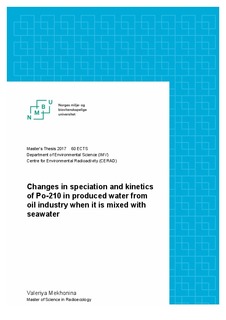| dc.description.abstract | Petroleum production on the Norwegian continental shelf is accompanied by the production of the largest by volume waste stream called produced water. Produced water discharged to the North Sea can contain elevated level of naturally occurring radionuclides (Ra-228, Ra-226, Po-210) causing concerns over its long-term effects on marine biota. However, to represent ecological risk the radionuclides in produced water should be available for biological uptake by marine biota. Biological uptake of radionuclides is determined by speciation or physico-chemicals forms of radionuclides. Radionuclides associated with low molecular mass species (LMM) are available for active uptake; radionuclides present as particles and colloids are usually biologically inert although could be available for passive uptake. Studies on speciation of the radionuclides present in produced water are limited and have been mainly focused on Ra-226. Speciation of Po-210, which is the major contributor to the radiation dose to marine organisms and humans via seafood, in the marine environment remains poorly studied and almost nothing is known about its speciation in produced water. Therefore, it seemed obvious to undertake a study that could somewhat fill this gap. Thus, a major objective of the present work was to characterize produced water from the oilproducing
platform Troll C with respect to polonium size speciation and to study how polonium speciation might change with time after mixing with seawater. The results indicated that produced water from Troll C contained elevated level of Po-210 amounted to 0.0612 Bq/l. Size fractionation of the produced water shown that more than 90% of Po-210 in the produced water was present as particles. Size fractionation of mixtures of produced water with seawater indicated that polonium speciation changed to some extent after 24 hours and 1 month of mixing, however in both cases the particulate Po-210 was still dominant over the colloidal and LMM species fractions. Although, seawater did not contribute to substantial solubilization of the particulate Po-210 neither 24 hours nor 1 month after mixing, it should be noted that a small fraction of the particulate Po-210 was mobilized just in the first 24 hours of mixing and no mobilization was observed after 1 month in seawater. Moreover, the LMM species fraction of Po-210 had a tendency to decrease with time. These things could be important with respect to time period when Po-210 might be most bioavailable for marine biota upon discharge. Overall, it could be concluded that seawater did not contribute to solubilization of the particulate Po to the extant that we expected suggesting that there were other factors responsible for Po dissolution, for example, anoxic conditions. Finally, it is important to note that the produced water was fractionated a few months after sampling, therefore some changes in Po speciation might had already occurred. We think that fractionation should be performed immediately after the produced water has been brought to the surface from the well while storage effects do not change Po speciation. This can be done only on the platform. | nb_NO |

